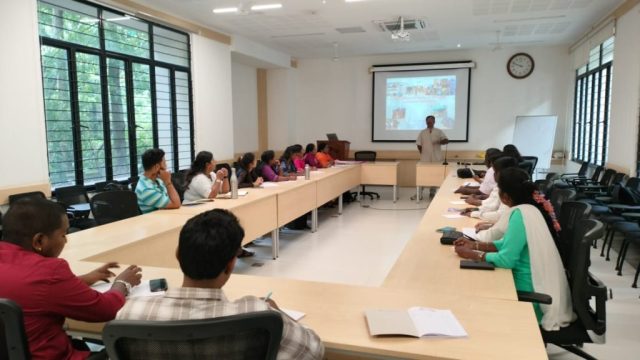73rd and 74th Constitutional Amendments | Two-Day Training Programme by Centre for the Study of Social Inclusion (CSSI)
October 13, 2025
 The Centre for the Study of Inclusion (CSSI), National Law School of India University (NLSIU), Bengaluru, in collaboration with and Thamate (ತಮಟೆ) Centre for Rural Empowerment, organised a two-day training programme for social workers on the theme “73rd and 74th Constitutional Amendments and Representation in Local Governments” on October 7 and 8, 2025.
The Centre for the Study of Inclusion (CSSI), National Law School of India University (NLSIU), Bengaluru, in collaboration with and Thamate (ತಮಟೆ) Centre for Rural Empowerment, organised a two-day training programme for social workers on the theme “73rd and 74th Constitutional Amendments and Representation in Local Governments” on October 7 and 8, 2025.
The programme aimed to strengthen the capacities of grassroots-level social workers and enhance their understanding of democratic decentralisation and inclusive governance in India.
Objectives of the Training
The primary objective of the training was to help social workers develop a deeper understanding of:
- The functioning of local self-government institutions,
- The importance of people’s participation in governance, and
- The role of the 73rd and 74th Constitutional Amendments in promoting democracy, equality, and social inclusion.
The training also sought to highlight how these constitutional provisions have created space for marginalised groups – particularly Scheduled Castes, Scheduled Tribes, and women – to actively participate in governance and decision-making processes at the grassroots level.
Participants
Social workers and community leaders from both rural and urban areas of Karnataka participated in the two-day workshop. The participants represented various community-based organisations, NGOs, and social development initiatives working on issues related to social justice, gender equality, and local governance.
Sessions and Discussions
Across the two days, participants engaged in a series of interactive lectures, discussions, and group activities that connected conceptual understanding with field-level experiences.
- Dr. Lakshmipathi C.G., Professor, Department of Sociology, Maharani Cluster university, Bengaluru, conducted a session on “Essential Qualities of a Social Worker and Methods of Working with Community and Local Governments.” He emphasised the ethical and professional values necessary for effective community engagement and discussed strategies for mobilising people to participate meaningfully in local decision-making processes.
- Dr. Chandrashekar R.V., Assistant Professor and Fellow, CSSI, NLSIU, delivered an in-depth session on “The Objectives, Significance, and Role of the 73rd and 74th Constitutional Amendments in Strengthening People’s Participation.” He explained how these amendments institutionalised local self-governance through Panchayati Raj Institutions (rural) and Municipalities (urban), thereby democratising development planning and empowering citizens. He also highlighted the importance of collaboration between voluntary organisations, civil society groups, and local government bodies to make governance more inclusive and participatory.
Valedictory Session
In the valedictory session, Dr. Obalesh, Director, Tamate Organisation, shared his reflections on the importance of strengthening local democracy. He emphasised that true democracy can only be achieved when marginalised communities and women are provided with genuine opportunities to participate in governance and decision-making processes.
Dr. Obalesh commended the collaboration between NLSIU and Tamate for organising this meaningful training and encouraged participants to apply the knowledge gained in their respective areas of community work to strengthen local institutions and promote social inclusion.
Outcomes of the Workshop
The two-day workshop enabled participants to:
- Understand the constitutional and legal framework of local governance in India.
- Recognise the importance of representation and participation of Scheduled Castes, Scheduled Tribes, and women in local government.
- Develop strategies to enhance community participation in local development planning and implementation.
- Strengthen their ability to collaborate with Panchayats and Municipalities for inclusive and equitable development.
The training concluded with a collective commitment from the participants to carry forward the spirit of the 73rd and 74th Constitutional Amendments in their respective areas of work, ensuring that local governance becomes a true platform for social justice, equality, and participatory democracy.





